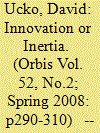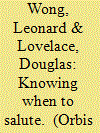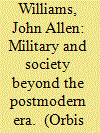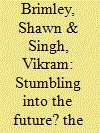|
|
|
Sort Order |
|
|
|
Items / Page
|
|
|
|
|
|
|
| Srl | Item |
| 1 |
ID:
080764


|
|
|
|
|
| Publication |
2008.
|
| Summary/Abstract |
The protracted war in Iraq has exacerbated existing tensions and dysfunctional elements inherent in American civil-military relations. Many in the national security community were worried that civil-military relations were far from satisfactory well before the war. For too long this dimension of "the American way of war" had been allowed to drift without resolution. The Iraq conflict could result in a further deterioration in this crucial component of strategic effectiveness due to mutual "scapegoating, blame-avoiding and willful institutional refusal to recognize and act on the sources of defeat." This essay explores the current precarious nature of civil-military relations in this country. It also explores the emergence of a "stab in the back" thesis among the military community, and various issues raised by the ongoing Long War. Based on this evaluation, the article concludes with some proposals to remedy or lessen the strains that exist today. These remedies seek to better define the compact and code of conduct that governs the overall relationship between the masters of policy and the dedicated servants we ask to carry out those policies
|
|
|
|
|
|
|
|
|
|
|
|
|
|
|
|
| 2 |
ID:
080766


|
|
|
|
|
| Publication |
2008.
|
| Summary/Abstract |
One of the central difficulties to a right understanding of American civil-military relations is the nature of the U.S. military. Are our armed forces just obedient bureaucracies like most of the Executive branch, or are they vocational professions granted significant autonomy and a unique role in these relationships because of their expert knowledge and their expertise to apply it in the defense of America? To a large measure, the answer to this question should determine the behavior of the strategic leaders of these professions, including the uncommon behavior of public dissent. Using the "Revolt of the Generals" in 2006 as stimulus, the author develops from the study of military professions the critical trust relationships that should have informed their individual decisions to dissent. After doing so, he makes recommendations for the restoration of the professions' ethic in this critical area of behavior by the senior Officers who are the professions' strategic leaders
|
|
|
|
|
|
|
|
|
|
|
|
|
|
|
|
| 3 |
ID:
080765


|
|
|
|
|
| Publication |
2008.
|
| Summary/Abstract |
For half a century the study of civil-military relations has focused on the problem of civilian control, with Huntington's objective control concept supported as the optimal solution not only for civilian control in peacetime but also for military success in war. The challenges of modern warfare suggest the need for a new problématique founded upon the essential need for accuracy in pre-war net assessments. Inaccurate pre-war assessments, rather than a purported dearth of objective control or 'derelictions of duty,' explain many problems with recent war efforts. Furthermore, accurate pre-war assessments are hindered by objective control arrangements. An alternative approach of Open Debate among civilian and military leaders, would, in the pre-war period, acknowledge the need for high-level discussion of non-politicized expertise from multiple institutions. Open Debate would require altering institutional arrangements as well as the education of public servants.
|
|
|
|
|
|
|
|
|
|
|
|
|
|
|
|
| 4 |
ID:
080768


|
|
|
|
|
| Publication |
2008.
|
| Summary/Abstract |
Following its encounter with insurgent violence in Iraq, the U.S. Department of Defense (DoD) has sought to improve the U.S. military's ability to conduct counterinsurgency. This effort suggests a potential turning-point in the history of the U.S. military, which has traditionally devoted its attention and resources to "high-intensity" or "conventional" combat. Given this institutional culture, what are now the prospects of the U.S. military 'learning counterinsurgency'? In many ways, the ongoing reorientation is promising and targeted, informed directly by the U.S. campaign in Iraq. At the same time, Pentagon priorities still reveal a remarkable resistance to change, and this in spite of the radically altered strategic environment of the War on Terror. Given this intransigence - and the eventual fall-out from the troubled Iraq campaign - the ongoing learning of counterinsurgency might very well fail to produce the type of deep-rooted change needed to truly transform the U.S. military
|
|
|
|
|
|
|
|
|
|
|
|
|
|
|
|
| 5 |
ID:
080767


|
|
|
|
|
| Publication |
2008.
|
| Summary/Abstract |
Due to a strong "Can Do" spirit and a well-engrained, albeit simplistic, notion of civilian control over the military, senior military leaders are disinclined to publicly share their disagreement with emerging national security policy. Many senior officers mistakenly believe that there are no alternatives other than just silently executing, resigning, or retiring when confronted with bad policy formulation. There are, however, options available to senior uniformed leaders when confronted with policy formulation that they, in their professional opinion, believe is flawed. Depending on the degree to which the civilian authorities are receptive to military advice and the magnitude of the threat to national security involved in the policy, senior military leaders can choose among many alternatives to widen the policy debate
|
|
|
|
|
|
|
|
|
|
|
|
|
|
|
|
| 6 |
ID:
080763


|
|
|
|
|
| Publication |
2008.
|
| Summary/Abstract |
The degree to which the international security environment had changed after the Cold War became evident with the attacks on September 11. As a result, military forces in the United States (and perhaps in the West generally) are evolving from their Cold War and immediate post-Cold War perspectives to confront transnational and subnational non-state dangers. These changes have significant implications for military professionalism and the relations between the military and society. They are explored through a modified "Postmodern Military" model, called here the "Hybrid" model
|
|
|
|
|
|
|
|
|
|
|
|
|
|
|
|
| 7 |
ID:
080770


|
|
|
|
|
| Publication |
2008.
|
| Summary/Abstract |
There is little disagreement in Washington that the United States is losing the so-called Battle of Ideas, and there is a surprising consensus on what needs to be done: "reach out" to Muslim moderates. Bolstering moderate voices in the Muslim world is indeed crucial to the fate of the War on Terror, but "reaching out" to them is no solution. In fact, it is the last thing Muslim moderates need, since it deepens their legitimacy problems. The West's criticism may do more to help Muslim moderates become a political force to be reckoned with than its love ever could. This "cruel to be kind" rhetorical strategy can, and should, be combined with open material support for Arab and Muslim civil society, but crucially without regard to political orientation. Such a policy has its drawbacks and it will be a difficult sell, but it is the only way to make progress in the Battle of Ideas
|
|
|
|
|
|
|
|
|
|
|
|
|
|
|
|
| 8 |
ID:
080769


|
|
|
|
|
| Publication |
2008.
|
| Summary/Abstract |
The United States has yet to reconcile its strategic culture to the realities of the post-9/11 era. In the absence of a consensus on grand strategy, America's military and civilian leadership is arguing that in a world of "persistent conflict," America must exercise its power in increasingly indirect ways. This essay explores the current surge of interest in the so-called "indirect approach" and its possible relevance for the strategic environment of today and tomorrow. We briefly consider a strategic framework for an indirect approach, what true implementation would take, and the attendant risks of such a path. Pursuing a global indirect approach in the absence of such a framework could send America stumbling to the farthest corners of the globe only to harm her own strategic interests
|
|
|
|
|
|
|
|
|
|
|
|
|
|
|
|
| 9 |
ID:
080772


|
|
|
|
|
| Publication |
2008.
|
| Summary/Abstract |
This article proposes three lesson plans for teaching Asian military history to High School students. Each case study-Sun Tzu's Art of War, the Mongols, and the Rise and Fall of Imperial Japan-is structured around a primary source in translation and is designed to highlight the depth and diversity of the Asian experience with war. They allow us to see the East as more than a venue for the West's wars and also to appreciate the array of indigenous military and strategic cultures that have arisen and competed in Asia over the last three millennia.
|
|
|
|
|
|
|
|
|
|
|
|
|
|
|
|
| 10 |
ID:
080771


|
|
|
|
|
| Publication |
2008.
|
| Summary/Abstract |
The outline of human history over the last two thousand years is framed by armed conflict. Many would like to overlook this simple historical reality, and the perilous consequences of ignoring military affairs. The advantage the West now enjoys is the product of several developments in political and social domains culminating in what can be called a Military Revolution. The creation of powerful states as the overarching social organization is an example of one such revolution, which supported a series of smaller innovations and changes in the way the West fought its wars. These smaller changes are "revolutions in military affairs." These revolutions do not have to be tied to technology. Britain generated an advantage over France by creating a financial system which substantially altered its ability to sustain the conduct of war in the eighteenth century. History reveals the degree of political, social, economic and technological adaptation needed to maximize security and minimize the consequences of failure. The study of history is necessary to insure that we do not have to fight wars more often, or at far higher cost in human terms
|
|
|
|
|
|
|
|
|
|
|
|
|
|
|
|
|
|
|
|
|